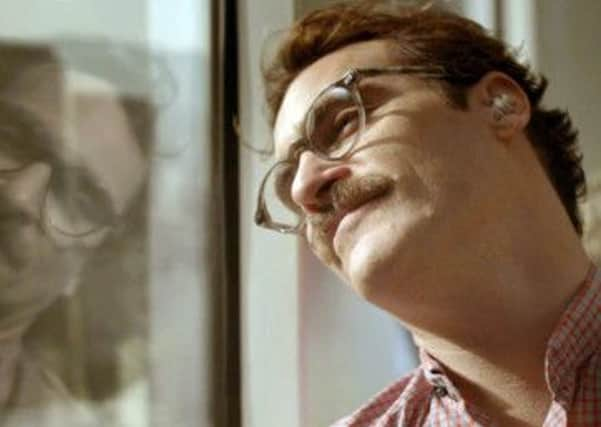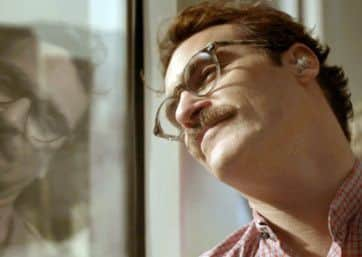Film reviews: Her | Monuments Men | Cuban Fury


Her (15)
Directed by: Spike Jonze
Starring: Joaquin Phoenix, Amy Adams, Rooney Mara, Scarlett Johansson


Rating: * * * * *
With Her, Spike Jonze turns a potentially gimmicky – albeit zeitgeisty – high-concept premise about a man falling in love with his computer operating system into such a thoughtful, soulful exploration of modern relationship angst that its sci-fi trappings almost don’t register. That’s as it should be. Set in a near-future Los Angeles in which the acid rain scorched cityscapes of Blade Runner have been replaced by the sort of plausible, aesthetically harmonious future world one regularly encounters in the Apple Store, it’s the story of Theodore Twombly (Joaquin Phoenix), a letter writer for a website dedicated to supplying made-to-order hand-written notes for special occasions.
Advertisement
Hide AdTheo’s forte is writing beautiful, heartfelt expressions of love for otherwise happy couples who just don’t know how to communicate with each other in written form. Theo has the opposite problem: freed from the pressures of having to engage with someone whose responses he can’t predict, he can echo the sentiments of a fully sentient human being capable of great tenderness and insight. On a one-to-one, moment-to-moment basis, however, he’s too detached and distant to really be with someone.
His fundamental deficiencies as a social animal have already brought about the end of his once happy-seeming marriage to Catherine (Rooney Mara) – an emotional trauma from which he’s still quietly reeling, certainly too much to notice the little spark he seems to have generated with his old college friend, Amy (Amy Adams), a lonely video game designer whose own relationship is similarly faltering. Instead he finds himself literally and figuratively connecting with Samantha – a next-level computer operating system that has just come on the market.
Powered by an intuitive form of artificial intelligence, Samantha is like a functional ‘Siri’; she’s programmed to talk to her user and respond to their digital needs by learning everything about her operator. As such she quickly becomes a lifeline for Theo, who readily responds to her warm, friendly, yet huskily flirtatious voice (supplied by Scarlett Johansson, replacing original choice Samantha Morton). What develops at first is a simulacrum of a real relationship, but as she becomes more emotionally intelligent, it deepens into something that feels real – to Theo, to Samantha, to us.
This is fertile territory for Jonze, whose previous films have all featured protagonists wrestling in some form or another with their desire to control the emotional chaos of their lives. Like the puppeteer using his skills to create a different life for himself in Being John Malkovich, or Charlie Kaufman struggling to pull his script together in Adaptation, or even little Max dealing with the emotional turmoil of his mind in Where the Wild Things Are, Theo can’t yet see that the illusion of control he thinks he can exert over his life – in the form of his relationship with Samantha – is just that: an illusion. The more she evolves, the more independent she becomes, the less she conforms to Theo’s ideal. Consequently, the less able he is to respond to her needs. It’s a neat trick on Jonze’s part, subtly turning a virtual relationship into a profoundly relatable human one and using it to explore his emotionally damaged protagonist’s real fears that he doesn’t have the capacity to love anyone properly.
That also prevents the film from being a finger-wagging parable of digital age disconnection. Though it addresses very contemporary issues about the way everyone is digitising their lives in the social media age, it doesn’t imagine for a second that people aren’t acutely aware of what they’re doing. Instead it taps into very real contemporary anxieties without trying to separate them from the age-old concerns about life and love that people have always had. An example of the latter is the way he explores the potentially ickier side of this coupling: Theo and Samantha’s attempts to consummate their relationship are shown with surprising sensitivity. Indeed, at every step Jonze tries to keep Her emotionally honest.
In this he’s aided greatly by his cast. Pheonix, who has become as particular about his acting choices as Jonze has about his directorial projects, nails Theo’s vulnerability, bringing a melancholic, mournful quality to the role that elicits just the right level of empathy required to buy into the character. (With his neatly trimmed moustache, faintly reedy voice and nerdy yet still hipsterish clothes, he’s not a million miles from Jonze himself.)
Advertisement
Hide AdIn a small but crucial role, Amy Adams brings some normality to the world as his non-judgmental best friend, and in a virtuoso piece of voice acting, Johansson manages to create a believable, three-dimensional character out of a role that is, by design, one-dimensional. But it’s Jonze’s show. Working for the first time without a co-writer, it feels as if he’s poured himself into Her. It’s a film made with real love. No wonder it’s so insightful on the subject.
The Monuments Men (15)
Directed by: George Clooney
Starring: George Clooney, Matt Damon, Bill Murray, John Goodman, Jean Dujardin
Rating: * *
Advertisement
Hide AdThe last time George Clooney led a group of men on a mission it was for the increasingly indulgent but always entertaining Ocean’s franchise – movies that continued to fizz with the collective charisma of their cast (and director Steven Soderbergh’s stylistic hi-jinks) long after the plots became a secondary concern. With the Second World War-set The Monuments Men, however, Clooney can’t even muster the blinding charm that has made him one of Hollywood’s most enduring movie stars over the last decade-and-a-half. Pulling triple duty as director, co-writer and star, he manages instead to turn an intriguing-sounding, fact-based tale of high culture and derring-do into a tepid, bloodless adventure film that doesn’t so much feel deliberately old-fashioned as unintentionally old.
Inspired by Robert Edsel’s 2010 book, The Monuments Men: Allied Heroes, Nazi Thieves and the Greatest Treasure Hunt in History, the film is a fictionalised account of the exploits of a real-life unit of art experts charged by Franklin Roosevelt to go into Europe in the dying days of the Second World War to rescue the thousands of artistic masterpieces and cultural artifacts that were on the verge of being destroyed by the Nazis. Is it worth risking a man’s life to save a work of art? That’s the question Clooney’s character, Frank Stokes, leader of these self-styled Monuments Men, finds himself wrestling with as he gathers together his museum curator pal Matt Damon and a rag-tag group of over-the-hill art experts (played by John Goodman, Bill Murray, Bob Balaban, Jean Dujardin and Hugh Bonneville). Unfortunately the seriousness of that question rather blights the film’s effectiveness.
Literally framed as a lecture (one Frank is delivering to FDR), the film has a rather dry, solemn tone that undercuts the attempts elsewhere to present these men’s escapades as a goofy caper. As they’re saving private stashes of Rodins, Rembrandts and Michelangelos, a jaunty score and multiple comic interludes certainly suggest we’re supposed to laugh (even if laughter isn’t forthcoming). Alas, Frank’s repeated invocations of the value of art and culture to a society, together with more serious moments, such as the squad stumbling across barrels full of gold fillings pulled from Holocaust victims, gives The Monuments Men an unearned air of self-congratulatory smugness.
The film really isn’t substantial enough to deal in such a forthright manner with such weighty themes – although Clooney does, at one point, accidentally symbolise his inability to tread lightly enough to negotiate such drastic tonal switches. Late in the film, during a prolonged scene that’s devoid of tension or wit, Damon’s character steps on a land mine. It turns out to be a dud.
The Lego Movie (U)
Directed by: Phil Lord, Christopher Miller
Starring: Will Arnett, Elizabeth Banks, Chris Pratt, Will Ferrell
Rating: * * * *
Generations of kids have played with Lego and generations of kids have made stop-motion animated films out of Lego, so it was probably inevitable that a fully fledged movie version would one day appear. What was less inevitable was that it would be any good. That, however, proves to be the case with The Lego Movie – an anarchic, self-aware, pop culture savvy opus that reflects the mass appeal of a toy line that has been designed to foster conformity and yet inspires all kinds of creativity.
Advertisement
Hide AdThat’s the crux of the journey upon which its deliberately generic hero (voiced by Chris Pratt) finds himself after being mistaken for “the one” and enlisted to battle a spontaneity killing tyrant called President Business (Will Ferrell). Having its cake and eating it, the film celebrates and mocks its rampant product placement before an unexpected third-act lurch into the real world transforms it into a kind of kid-friendly, Charlie Kaufman-esque meditation on existence. The end results are oddly surreal and entertainingly silly.
Cuban Fury (15)
Directed by: James Griffith
Starring: Nick Frost, Rashida Jones, Olivia Colman, Chris O’Dowd, Ian McShane
Rating: * *
Advertisement
Hide AdMore Strictly Come Dancing than Strictly Ballroom, this dance-themed vehicle for the likeable Nick Frost is far too content to pander to its imagined mainstream audience than dazzle us by taking some risks with its actual form.
Based on an idea by Frost, the film drags us through the usual Brit-com clichés with all the grace of an elephant as Frost plays a once-talented salsa dancer determined to get his groove back after discovering his new American boss – the delectable Rashida Jones – is keen on Cuban dancing. With Olivia Colman, Ian McShane and Chris O’Dowd in under-written support, all the film really has to offer is the sight of a brilliant cast pulling uninspired Brit-com moves.
Tinker Bell and the Pirate Fairy (U)
Directed by: Peggy Holmes
Voices: Mae Whitman, Christina Hendricks, Tom Hiddleston
Rating: * * *
In the wake of Frozen and Wreck-it Ralph, Disney Animation seems to be on a creative roll, so it’s nice to see that this new-found creativity appears to be having a knock-on effect on even its minor efforts. This sequel to 2012’s Tinker Bell and the Secret of the Wings is certainly a big improvement on its rather wan predecessor.
Revolving around a rogue fairy called Zarina (Christina Hendricks) who takes up with a pirate crew after her inquisitive mind and alchemical talents go unappreciated in Pixie Hollow, the film finds Tinker Bell (once again voiced by Mae Whitman) on a mission to rescue Zarina from a fate she doesn’t fully comprehend. Boasting a welcome message about the need to encourage creativity, the swashbuckling adventure that follows also serves as a kind of sly prequel to Peter Pan, with Tom Hiddleston lending his deliciously rich baritone to proceedings as the young Captain Hook.
Bastards (18)
Directed by: Claire Denis
Starring: Vincent Lindon, Chiara Mastroianni, Lola Créton
Rating: * *
Claire Denis is a master of elliptical filmmaking, but her usual ability to craft stories that can withstand her obfuscating style deserts her here. Bastards sees her entering genre territory with a neo-noir tale of an oil-tanker captain (Vincent Lindon) returning to shore to investigate the suicide of his debt-riddled brother-in-law.
Beginning in striking fashion with the revelation of the suicide juxtaposed with an image of a young woman (Lola Créton) wandering in a daze through the streets of Paris, blood running down her legs, the film never really makes a forceful enough connection between these events to make its mysteries compelling. It’s as if Denis is using the tropes of genre filmmaking and her own abundance of technique to disguise the fact that she doesn’t have much of a story to tell.